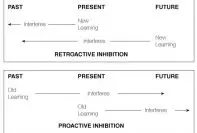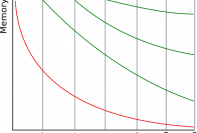The form of interference where old memories restrain the capacity to remember new information is called Proactive Interference. The idea of proactive interference is not at all uncommon. In fact, this has happened to everyone in different times in life. A simple example for this kind of interference would be when trying to learn two different things.
Example: You might have recently learned the names of different countries in Asia, and later on you might have learned the names of different countries in Africa. If you were now made to recall the names of countries in Africa, you might mix up the countries in Asia. The information seems to be jumping in front of each other and the memories jumble up.
This is just one of the examples of how proactive interference occurs. Proactive interference occurs when past memories hold back an individual from retaining new memories.
It has been hypothesized that
Forgetting working memories would be non-existent if not for proactive interference.
This means, we would be easily recall new information in our working memories without jumbling up two different memories. Forgetting working memories would be something that never happened.
Context
We have already established that proactive interference occurs when past memories inhibit retention of new memories. But for this to happen, the memories must be of similar contexts.
With lists
Researchers have discovered that proactive interference occurs with lists. Individuals were given a list of items to be remembered. It was seen that the ability to remember the list was hampered as the number of items were increased. But, the effect of proactive interference was seen to increase with multiple lists. When participants were made to recall the list of different items, they were able to recall 70% of the items. However, when the participants were given a new list to remember the next day, they could only recall 40%, and with another list it declined to 25% of the items. Therefore, it was seen that proactive interference affected the recalling of latest list because of the previous lists.
However, proactive interference was not as effective when the test was immediate and when the lists were of different items.
Span performance
Span performance refers to working memory capacity that deals with language comprehension, memory and problem solving. In different experiments, span performance in later tests/trials was seen to be worse than the performance in previous trials. Individuals with high working memory spans were less affected by proactive interference when only dealing with a single task, however, the case of occurrence of proactive interference was similar among both (individuals with high memory span and low memory span) when made to deal with multiple tasks.
It was seen that individuals were more likely to associate information from two different memories. This caused impairment and retardation in span performance due to proactive interference.
Examples
- Let’s assume that you are in a new city and have just learned directions to go to a certain café. But, later while trying to recall the memory; it might get interfered with the previously learned direction which would take you to a shopping center instead.
- Every year, after January 1st, most people tend to write the previous year while writing dates.
- You took Spanish classes a while ago. And now, while trying to learn French, you tend to use Spanish vocabulary in the French class, thus hindering your ability to learn French.
- A girl changes her last name after she gets married. But, whenever she is asked her full name, she might still say her previous last name out of habit.



